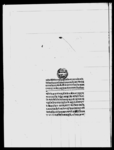A lālamohara of King Rājendra exempting Sunuvāras of the entire kingdom from cākacakuī fines, maryo aputālī etc. (VS 1887)
ID: DNA_0013_0069
Edited and
translated by Christof Zotter
in collaboration with
Ramhari Timalsina and Astrid Zotter
Created: 2017-06-30;
Last modified: 2017-07-28
For the metadata of the document, click here
The accompanying edition, translation/synopsis and/or commentary are available under the terms of the Creative Commons Attribution-ShareAlike 4.0 International License
Abstract
This lālamohara of King Rājendra addressing Sunuvāras throughout the realm, sanctions a thiti bandeja through a copperplate, according to which the addressees are granted an exemption from payment of cākacakuī fines and the state acquisition of maryo aputālī, and from enslavement as punishment for other offences, such as incest and infanticide.Diplomatic edition
[1r]
श्री\[royal seal]1स्वस्तिश्रीगिरिराजचक्रचूडामणिनरनारायणेत्यादि2विविधविरुदावलिविराजमानमानोन्नतश्रीमन्म
3हाराजाधिराजश्रीश्रीश्रीमहाराजराजेन्द्रविक्रमसा
4हवहादूरसम्सेरजङ्ग्देवानांसदासमरविजयि़ना
5म्¯ ¯ ¯ ¯ ¯ ¯ ¯ ¯ ¯ ¯ ¯ ¯ ¯ ¯ ¯ ¯ ¯ ¯ ¯
6आगेत्रिशूलगंगापूर्वमेचीपश्चीमभरमुलुक
7कासुनुव़ारके•तिम्हेरुकाघरकोअघिदेषिच
8लिआयाकोरितिथितिमाहाँम्रादर्वारमापस्याका
9पसुईव़ाहेकचाकचकुईमर्योअपुतालीमाफग
10रिऔहड्फोरा•जातक्मारारअरुविराउमाफि
11ककाषतमानीतीस्मृतिगर्नु•जिय़नमासनुभनि
12थितिवंदेजवाँधिताम्वापत्रगरिवक्स्यौंईतिसम्व
13त १८८७ सालमितिमाघसुदि १२ रोज ३ शुभम्
Translation
[1r]
[royal seal]
Hail! [A decree] of him who is shining with manifold rows of eulogy [such as] ‘The venerable crest-jewel of the multitude of mountain kings’ and Naranārāyaṇa (an epithet of Kṛṣṇa) etc., high in honour, the venerable supreme king of great kings, the thrice venerable great king, Rājendra Vikrama Śāha, the brave swordsman, the divine king always triumphant in war.
Āge: To Sunuvāras throughout our realm, east of the Triśūlagaṅgā and west of the Mecī
We have issued a copperplate sanctioning the [following] custom (thiti bandejabā̃dhi) 1 : "In line with the customary practice of your households since earlier times, [all of you]—except for pasuīs 2 who enter our palace (darabāra)—are exempted from [the payment of] fines for illicit intracommunal sexual relations (cākacakuī)3 and [state acquisition of] escheatable property (maryo aputālī), while incestuous sexual relations (hāḍaphorā), infanticide (jātakamārā) and other [such] wrongdoing (birāu) are to be treated under law (nītismṛti)4 according to the infringements, [but you] are not to be enslaved [as punishment]."
Tuesday, the 12th of the bright fortnight of Māgha [of the Vikrama] era year 1887 (1831 CE).5
Commentary
Although the lālamohara does not refer to any earlier document regarding the issue addressed and explicitly mentions traditional customs as a former source of authority, it seems that the present document is actually a reconfirmation of an older edict. M.C. Regmi 1982: 135 (with reference to Regmi Research Collection Vol. 42, p. 320) mentions a document issued on Pauṣa śudi 10, VS 1875 (1818 CE) which states, according to his abstract, that the "Chak-Chakui fines for adultery were abolished for the Sunuwar community in the region situated between the Trishuli and the Mechi rivers [... and that] the state relinquished its right to appropriate escheat property from members of that community" (ibid: 135). According to Regmi, "in consideration of these concessions" (ibid.), a salāmī levy was imposed on all Sunuvāra households in that region (for further details, see ibid.: 135f. with reference to a decree promulgated on Jeṣṭhā śudi 11, VS 1875 [Regmi Research Collection Vol. 42, pp. 318-319]).
Similar arrangements were made for other ethnic groups, for instance the Guruṅs (see e.g. Fezas 1986: 173 [3.1.4 = DNA_0012_0053]) and the Magaras (see e.g. Fezas 1986: 173 [3.1.2 = DNA_0014_0028]; on the Magaras' payment of a salāmī levy in order to obtain an exemption from the maryo aputāli, see Fezas 1986: 172 [3.1.1 = DNA_0014_0023] and M.C. Regmi 1988: 177-180).
In the case of ascetics, the maryo aputālī was assigned to the central overseer of the tradition in question; see DNA_0014_0050 (re jogīs) and DNA_0015_0033 (re saṃnyāsīs), both with further references.
For Stiller 1976, who discusses a case similar to the present one (ibid.: 174), such documents provide an official record of the “essential dialogue by which the Hindu ideal was accommodated to local custom” (ibid.: 172). While certain areas of conduct (such as the slaughter of cows or intercaste sexual offences between high-caste Hindus and lower- or non-caste Hindus) fell outside the bounds of this dialogue and met with severe punishment, other local customs that were in direct opposition to Hindu law but did not affect the religious practices of orthodox Hindus received special treatment. Stiller describes the pattern of this usually three-step procedure as follows: “[T]he government, either at the centre or at the local level, passed an ordinance or made a ruling that outlawed certain practices that were commonly permitted in the area; an appeal was made to the centre explaining that this ruling infringed on a traditional practice of the place; and the centre then normally permitted an exception from the general law under certain specific conditions.” (ibid.)

